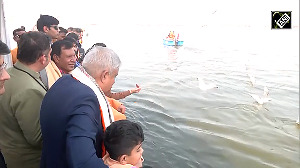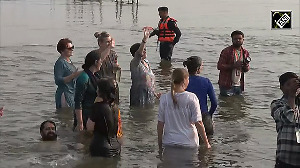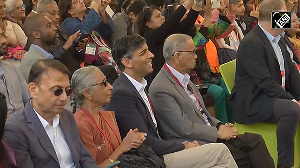Even as the US and the European Union played down the joint proposal by the 21-member coalition of developing countries, representatives from the group threatened to block negotiations on all issues if their concerns on agriculture were not factored in by the World Trade Organisation.
Agriculture took centrestage as the G-21, with Egypt becoming its latest member, criticised the WTO's General Council for not acknowledging their framework, which was put out in response to the joint proposal by the US and EU on August 13.
| |||||||||||
The members of the coalition, including India, Brazil and China, met to show their strength and stall any chances of a break-up.
A joint declaration by the group said the WTO draft text was not in line with the goals set out at the Doha ministerial meeting.
"It will be our endeavour to see that our concerns are addressed," Commerce Minister Arun Jaitley said at the joint press conference of G-21 members.
While US Trade Representative Robert Zoellick said all proposals could not be part of the ministerial text and called for a meeting early next year to work out the details of the agriculture trade reforms scheme, EU Trade Commissioner Pascal Lamy continued with his assault on the G-21 and said the members of the coalition did not share common interests.
At the plenary session of the fifth ministerial meeting, which began in Cancun on Wednesday, the WTO made a fervent plea to its members to bury differences and stop the multilateral trading system from floundering.
"All problems have not been solved and differences persist. The Cancun ministerial meeting needs to produce a balanced outcome. Every country will pursue its national interest. I would ask you to bear in mind that your interests cannot be achieved unless we have an outcome that offers something to all," WTO Director-General Supachai Panitchpakdi said in his opening remarks.
India is trying to forge an alliance, similar to that on farm trade, on the Singapore issues and Jaitley, who held a meeting with the like-minded group on Tuesday, is slated to attend a meeting of the 17-member core group on the Singapore issues, which includes China.
While India asked members to postpone negotiations on these issues, the EU pushed for inclusion of the four subjects -- investment, competition policy, trade facilitation and transparency in government procurement.
The US only wants negotiations on the last two subjects. A bilateral meeting between India and China went on till late Tuesday night as India tried to unite developing countries on various issues.
The Cairns group also came out in support of the G-21, though some members of this alliance like Australia and New Zealand are not part of the developing country alliance.
Panitchpakdi played down Zoellick's position that all the proposals could not be part of the ministerial text and told reporters on the sidelines of a book-release function, organised by the Confederation of Indian Industry, that the text had not been finalised and there was scope for revision.
At a press conference, Lamy said the US-EU joint framework was circulated after WTO members, including India, asked the two to prepare a roadmap for trade liberalisation.
The claim was, however, denied by Indian officials, who said the US and EU had offered to work out the package on their own.
While seeking a set of similar rules for developed and developing countries, Lamy said countries like India, Brazil and China, should not be treated at par with others that were less developed but classified as developing nations.
He also said developing countries had to make some compromises and all the sacrifices could not be made by developed countries alone.
Despite the joint proposal, the US and EU were not short of pursuing their original agenda. Zoellick asked for more agricultural reforms by the EU, while Lamy said Brussels had made progress on reforming its agricultural policies and now Washington had to move.
How Cancun will work
Plenary: The session is scheduled for Wednesday morning to initiate the Facilitator Groups. The head of delegation of each country will make a formal speech at the plenary, but the negotiations will take place in the backrooms.
Facilitator Groups: Known as 'Green Rooms' till the Doha ministerial, they were subsequently renamed as 'Friends of the Chair'. There are five different Facilitator Groups, dealing with each of the main areas under negotiation. Singapore has been assigned the task of heading the most contentious one, the Facilitator Group on Agriculture.
Committee of the Whole (CoW): This is a smaller plenary. Though all WTO members are permitted to participate in it, each country can only send two representatives. Each Facilitator Group will report to the CoW in case of progress in their areas of negotiation. In the absence of progress, the chair will decide on whether negotiations are to continue, according to the practice that emerged in Doha.






 © 2025
© 2025